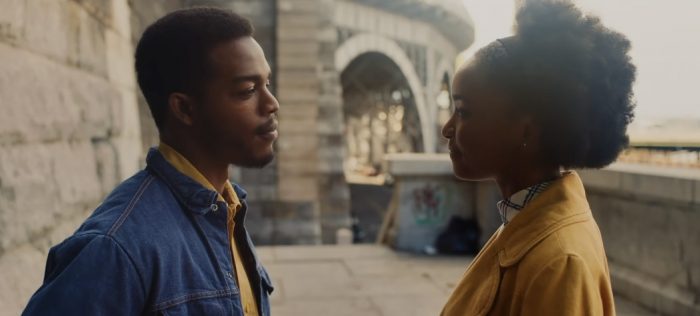IF BEALE STREET COULD TALK
Directing: B+
Acting: A-
Writing: B+
Cinematography: A-
Editing: B+
If Beale Street Could Talk is a movie full of beautiful people, perfectly framed and gorgeously lit, navigating increasingly sobering lives, an earnest romance at their center. Based on the book by James Baldwin, whose work I have never read, it’s still unsurprising that Baldwin should present a story so frank about both the emotional nuances of everyday lives, and the stark realities of black lives, here presented in early 1970s Harlem.
Director Barry Jenkins, who adapted the screenplay himself, here presents his follow-up to Moonlight, the best movie of 2016, so this has a lot to stack up against. Moonlight remains Jenkins’s definitive achievement, but If Beale Street Could Talk has plenty of its own to offer. Much of the cinematography is similar (James Laxton shot both films), so virtually every frame is stunning to look at — even when the characters are gazing directly into the camera, which happens a lot.
There is something about the trailer, however, that seems to have been slightly misleading. We’re led to believe this story is primarily about young Tish and Fonny’s respective families reacting to Tish being pregnant. The opening scenes are all focused on Tish breaking the news: first to Fonny through visitation glass at the prison where he’s serving time for a crime he did not commit; then to her mother; then to her father and sister; then to Fonny’s parents and sister.
This family visitation sequence goes on for some time, intercut with flashbacks of Tish and Fonny’s budding romance, after years of friendship since childhood. Fonny’s mother in particular is hardcore religious, all judgment in the name of Jesus. It seems curious that there should be such focus on this woman, played excellently by Aunjanue Ellis, only to have her never appear in the story again. Even Fonny’s father (Michael Beach) appears a couple of times after this, however briefly.
So, at first, If Beale Street Could Talk seems to be about families with clashing viewpoints on the single thing that promises to keep them linked forever — Tish and Fonny’s baby. But then we learn why Fonny is in prison, and although there is complexity in the details, the reason is broadly simple: the racist scapegoating of black people. It’s an interesting time to be seeing a movie whose plot hinges on a false accusation of rape, but we might do well to remember that this happening to black men, thereby absolving white men of responsibility, is not exactly without precedent.
It would be easy to pick apart If Beale Street Could Talk on grounds of supposed political correctness — a moment of domestic between the older parents is basically gleaned over by everyone present; Fonny jokingly refers to the baby as a “midget” that kicked Tish from inside the belly. But it’s important to keep the proceedings in historical context. American culture was in a very different place in a lot of these aspects in the early seventies — except, of course, for systemic racism, which far too many people are happy to ignore while nitpicking at these other issues. One wonders if Barry Jenkins might be making a subtle point about this.
Because If Beale Street is by and large made of subtleties, executed with great finesse. This movie certainly stands apart in terms of the story it’s telling, how it’s being told, and the people it’s about — all things it also has in common with Moonlight. This is a romance of unique sensitivity, and in the context of its setting, it’s striking to see a young woman met with such tenderness by her entire family when faced with the prospect of her being pregnant at nineteen. This tenderness includes both her own father (Colman Domingo) as well as Fonny’s father; Tish gets great emotional support as well from her mother (Regina King) and sister (Teyonah Parris).
Jenkins fills his films with indelible imagery, often deeply affecting, whether it be the one love scene depicted between Tish and Fonny, or a wonderful shot of baby, mother and grandmother moments after a home birth. And without exception, Kiki Layne and Stephan James are lovingly shot as their great performances serve as emotional anchor to the arc of their story. From beginning to end, If Beale Street Could Talk has a tone and effect that could only be described as hypnotic.
This movie is no fantasy, though, and it ends with a sense of resignation rather than anything particularly joyful. Upon deeper reflection, it remains a testament to the power of love and devotion, which comes with it at least some sense of uplift. Here is a powerful story which pointedly demonstrates that even when it comes so naturally, love isn’t easy.
Looking into a bottomless well of romantic notions across a narrow divide.
Overall: B+

